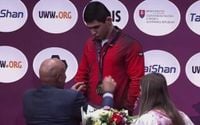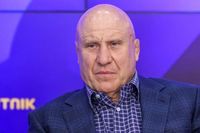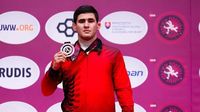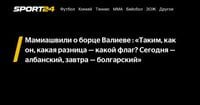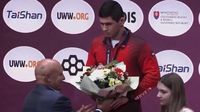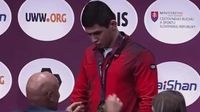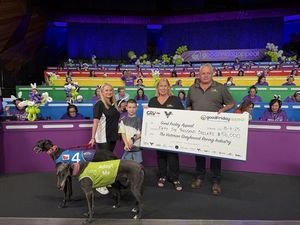In a dramatic turn of events at the European Freestyle Wrestling Championship held in Bratislava, Slovakia, on April 9, 2025, Mikhail Mamiashvili, the President of the Russian Wrestling Federation, ignited controversy by labeling Albanian wrestler Chermen Valiev a "traitor" during the medal presentation ceremony. This outburst occurred shortly after Valiev clinched the gold medal in the 74 kg weight category, having defeated Russian Olympic champion Zaurbek Sidakov with a score of 4-2.
The championship, which saw intense competition among wrestlers from various countries, culminated in a heated final match between Valiev and Sidakov, both hailing from North Ossetia. The bout was closely contested, with Valiev's victory confirmed after a successful challenge on a 4-4 tie, showcasing his skill and determination on the mat.
During the award ceremony, Mamiashvili's comments were not just limited to calling Valiev a traitor; he reportedly used abusive language and expressed his displeasure at Valiev's decision to compete for Albania after having previously represented Russia. "I congratulated him on his victory. Maybe he was surprised that I was awarding him, because just a year ago, he was part of our national team," Mamiashvili stated in a later interview. He further emphasized the importance of national pride, saying, "For guys like Chermen, what difference does it make which flag they represent? Today it's Albanian, tomorrow it could be Bulgarian. They don't understand the value of the flag they carry on their shoulders. They don't realize the responsibility towards the country that made them athletes. Great Russia has made them what they are today. And now, the Albanian flag is in their hands."
This incident sparked outrage not only among fans but also within the wrestling community. Khetag Gozyumov, the head coach of the Azerbaijani team, witnessed the confrontation and approached Mamiashvili to express his disapproval of the disrespect shown towards Valiev. The situation escalated quickly, as social media erupted with reactions condemning Mamiashvili's behavior.
Dzambolat Tedeev, a former coach of the Russian national wrestling team, publicly criticized Mamiashvili's actions, stating that they contradicted the principles of sportsmanship and the long-standing traditions of wrestling. Tedeev remarked, "What happened not only tarnishes the reputation of Russian sports but also discredits Mamiashvili himself. It is irresponsible to undermine Russia's image in front of Europe. How can one accuse Valiev of betrayal when Mamiashvili has been sending Russian wrestlers to foreign teams for years, profiting from it? That is the real hypocrisy!" He praised Valiev's composure during the incident, saying, "Chermen displayed dignity like a true Caucasian. Personally, I would not have accepted a medal from such hands. He earned his victory honestly, yet received insults instead of congratulations."
As the championship progressed, the Russian team, competing under a neutral flag due to ongoing geopolitical tensions, managed to secure five gold medals, one silver, and one bronze. The final matches of the tournament showcased the depth of talent across various weight categories, with notable performances from several athletes. For instance, in the 57 kg category, Russian wrestler Nachyn Mongush triumphed over Azamat Tuskaev from Serbia, while Ibragim Ibragimov claimed victory in the 65 kg class against France's Hamzat Arsamertzuev.
However, the controversy surrounding Valiev's victory and Mamiashvili's remarks overshadowed the accomplishments of the athletes. The incident has raised questions about the treatment of athletes who switch nationalities and the pressures they face from their former federations. Valiev's decision to represent Albania after changing his sports citizenship from Russia in early 2024 has been a point of contention, particularly among those who feel a strong sense of national pride.
The aftermath of the incident continues to unfold, with calls for Mamiashvili to address his conduct and for the wrestling federation to clarify its stance on athlete representation and national pride. As debates rage on social media and within sports circles, the wrestling community watches closely to see how this controversy will impact future competitions and athlete relations.
In conclusion, the events at the European Wrestling Championship have highlighted not only the intense rivalries within the sport but also the emotional complexities athletes face when navigating national identity and allegiance. As Chermen Valiev basks in the glory of his hard-fought victory, the wrestling world is left to ponder the implications of Mamiashvili's remarks and the broader issues at play in the world of competitive sports.
